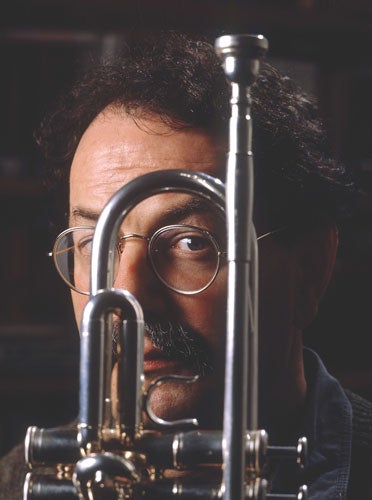Ian Carr: Trumpeter and composer whose band Nucleus was at the forefront of the jazz-rock movement

A modest and gentle fellow, the trumpeter Ian Carr was surprised when, as leader of the band Nucleus in 1970, he was thrust suddenly to the crest of the American jazz-rock boom. An ingénue to fame, he reacted to his instant eminence as incredulously as William Boot had in Evelyn Waugh's Scoop.
"It seemed we could do no wrong in America," Carr recalled. "I remember getting on a jumbo jet and flying back to London. Away from the madness, electricity, enthusiasm, friendliness, open-spiritedness, the extremes and professionalism of America, and back to the quiet anonymity of Britain. It was like returning from a forest full of wild beasts where one could never be certain who was the hunter or who or what was being hunted, to a small landscape garden with some plaster gnomes in it."
Formed in September 1969, Nucleus were an immediate and explosive success and in 1970 appeared at two of the world's most prestigious jazz festivals at Newport and Montreux. The band were inspired to some extent by the contemporary electrified experiments of Miles Davis, but mostly by Carr's wide-ranging ideas about exotic and non-Western improvisation and rhythmic patterns. These he combined with his own jazz improvisation and the sort of ostinato bass patterns brought into the rock field by Davis acolytes such as Herbie Hancock.
It was Davis, however, who was the pre-eminent influence on Carr's work and Carr became one of the world's leading scholars on the subject of Davis and his music. Apart from his musical talents he wrote prose with great style and also had a distinguished career as a radio presenter.
Carr grew up in the North East, started learning the piano when he was 12 and began teaching himself the trumpet when he was 17. He took a degree in literature at King's College, Newcastle-upon-Tyne and did National Service in the Royal Northumberland Fusiliers from 1956-58 before spending two years "wandering around Europe".
On his return to Newcastle, he involved himself in the local jazz scene and in 1960 joined his brother Mike's band, the EmCee Five. He travelled south to London in 1962 and joined Harold McNair's quintet, and then in 1963 formed a successful quintet with the tenor player Don Rendell that survived until 1969. The band recorded five albums for the enthusiastic producer Denis Preston. Carr also worked and recorded in those years with the New Jazz Orchestra led by Neil Ardley, and with Michael Garrick, Stan Tracey, Barbara Thompson and several other of the more adventurous bands.
He recorded with the inspired but ill-fated altoist Joe Harriott in 1969 and then, bringing his interest in Davis's jazz-rock electronics to fruition, formed Nucleus in 1970. The strength of Carr's own input gave the band originality and they successfully toured worldwide and made a total of 13 albums. Over the years Nucleus drew in some of the best musicians from the British jazz scene, including John Marshall, Karl Jenkins, Brian Smith, Jeff Clyne, Chris Spedding, Harry Beckett, Tony Coe and Ron Mathewson. Nucleus finally disbanded in the late Eighties.
In 1976 Carr had begun to tour Europe with the United Jazz and Rock Ensemble, beginning an association which was to last for the next 28 years. A trenchant and eloquent author, he shed light on some disgracefully overlooked titans of British jazz with Music Outside (1973), and co-authored Jazz: The Essential Companion (1987), revised in 1995 as Jazz: The Rough Guide. In 1991 he published Keith Jarrett The Man And His Music. But his great achievement as an author was Miles Davis: A Critical Biography (1982), which became one of the classic books on jazz when Carr expanded and revised it as Miles Davis: The Definitive Biography (1998).
Carr was one of the best of the BBC's jazz presenters and listeners enjoyed and came to trust his measured and lucid assessments of the music. He made two lengthy and remarkable radio series on Miles Davis and Keith Jarrett, travelling to New York with the Radio Three producer Derek Dreschler for his comprehensive research.
"I find him a joy to work with," said Dreschler. "It's jolly nice working with someone who really throws himself into it with such enthusiasm."
At the beginning of the decade Carr also collaborated with Mike Dibb to produce two seminal films for Channel 4 television, one on Davis and one on Jarrett. He taught as Associate Professor of Jazz at the Guildhall School of Music and Drama, and in 2006 he was given an award for Services to Jazz at the BBC Jazz Awards.
He had to fight much adversity for his life was dogged by ill-health and his first wife died in childbirth. He defeated cancer in the mid-Seventies but was afterwards subject to chronic fits of depression and in the last decade he suffered a series of strokes that led to the early onset of Alzheimer's disease, forcing him to spend his last years in a succession of care homes.
Steve Voce
Ian Henry Randall Carr, trumpeter, bandleader, composer, author, teacher: born Dumfries 21 April 1933; married firstly Margaret Bell (deceased, one daughter), secondly Sandy Major (marriage dissolved); died London 25 February 2009.
Join our commenting forum
Join thought-provoking conversations, follow other Independent readers and see their replies
Comments